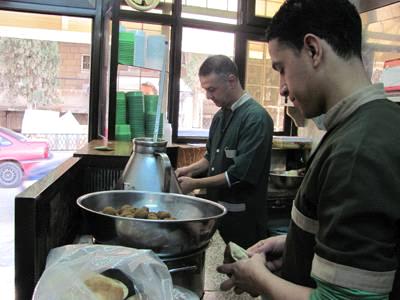Ammon News - AMMAN - Although for some people Abu Mahjoob is just a place to buy falafel, its regular patrons say the restaurant embodies the memories of Jabal Luweibdeh.
Abu Mahjoob is the oldest restaurant in the neighbourhood, according to Jalal Homsi, who co-owns the eatery with his brother Fouad.
Mohammed Ali, their grandfather and the founder of Abu Mahjoob, worked as a confectioner in Jaffa before moving to Amman in 1948, and was employed at the Automat Restaurant downtown from 1955 to 1961.
“When my grandfather decided to marry, he thought seriously about setting up his own shop in order to meet the needs of his family,” Jalal said.
“During my grandfather’s time, people weren’t scared of setting up their own businesses, unlike now, when they think so much before establishing a shop,” he added.
And so, in 1961 Ali established Abu Mahjoob in Jabal Luweibdeh.
The neighbourhood was the most luxurious part of the city during the 1950s and 1960s, according to Jalal, who claimed that only the most wealthy and prestigious families could afford to live in the area.
“Amman was small in the past. There weren’t many neighbourhoods during the 1950s. There was Jabal Amman, Jabal Luweibdeh, and parts of Jabal Hussein. Luweibdeh was an upper-class area that hosted the renowned families of Amman such as the Tarawnehs, Kalajis, Obeidats and others,” he pointed out.
Over the years, the restaurant became famous, attracting clients from all segments of Jordanian society, while its ownership passed down from Ali to his son Farouk Homsi, and then to Farouk’s sons Jalal and Fouad.
Jalal recalled that a fire nearly destroyed the restaurant in 1990, but his family was determined to keep the business running despite the difficulty and expense of rebuilding.
Abu Mahjoob was not only a place to eat, but also a popular gathering spot, where people would sit and chat for hours over hummus, falafel and tea, according to Jalal.
“In the summertime, there were many tables outside the restaurant, where people preferred to sit and eat... They really relished coming here,” the owner explained.
Adel Hassan, a long-time resident of Jabal Luweibdeh, described the restaurant as outstanding.
“I’ve been in Jabal Luweibdeh for 25 years. Abu Mahjoob manifests the history of old Amman. My friends used to visit me because they wanted to eat there, although there were similar restaurants in their neighbourhoods. Indeed, it was a splendid time,” the 49-year-old Hassan said.
Homsi fondly recalled a day in 1990, during his first week working at Abu Mahjoob, when His Majesty the late King Hussein stopped by his family’s restaurant.
“King Hussein and Khaled Karaki, the Royal Court chief, were on their way back to the palace at 9:00pm, when they came to Jabal Luweibdeh and stopped at Abu Mahjoob. Karaki came out of the car and bought from the restaurant,” the 40-year-old said.
Abu Mahmoud, a sanitation worker for the Greater Amman Municipality, told The Jordan Times that he has been a loyal client of the restaurant since he began working in Jabal Luweibdeh 10 years ago.
“Abu Mahjoob is not only a place where we eat, it’s one of the area’s landmarks,” the 50-year-old said.
Fouad, Jalal’s brother, noted that the changing cost of living in Amman over the past several decades is reflected in the restaurant’s prices.
“Prices were totally different from now. A plate of hummus, falafel and tea used to cost 70 fils. When we decided to raise the price to 100 fils, most of the customers complained,” he said.
Fouad claimed that Abu Mahjoob’s prices are still reasonable nowadays in spite of the higher cost of the ingredients used to make falafel, hummus and foul, noting that “a plate of hummus, falafel and tea currently costs JD1”.
Today, he said, the capital has changed, with many new neighbourhoods and restaurants of all kinds. But despite the city’s changing character and tastes, the Homsi brothers are determined to maintain the heritage of Abu Mahjoob as a testimony to Amman’s history.
“The people’s demands are different from the past, but we will not change our craft because our restaurant is a manifestation of both the heritage of the family and Luweibdeh’s history,” 45-year-old Fouad pointed out.
“We will exert our utmost efforts to maintain the family’s heritage forever,” he added.
(By Muath Freij/Jordan Times)
****Cooks prepare falafel and hummus at Abu Mahjoob Restaurant in Jabal Luweibdeh (Photo by Muath Freij)








 comment replay
comment replay 